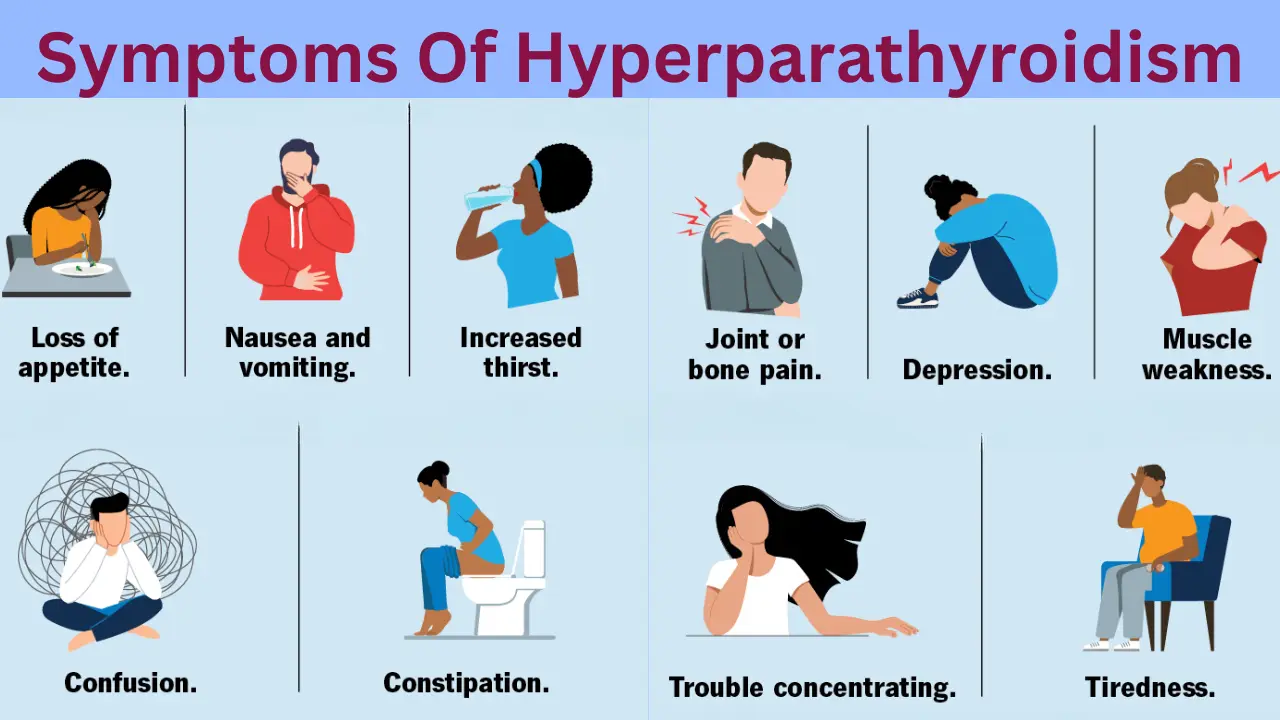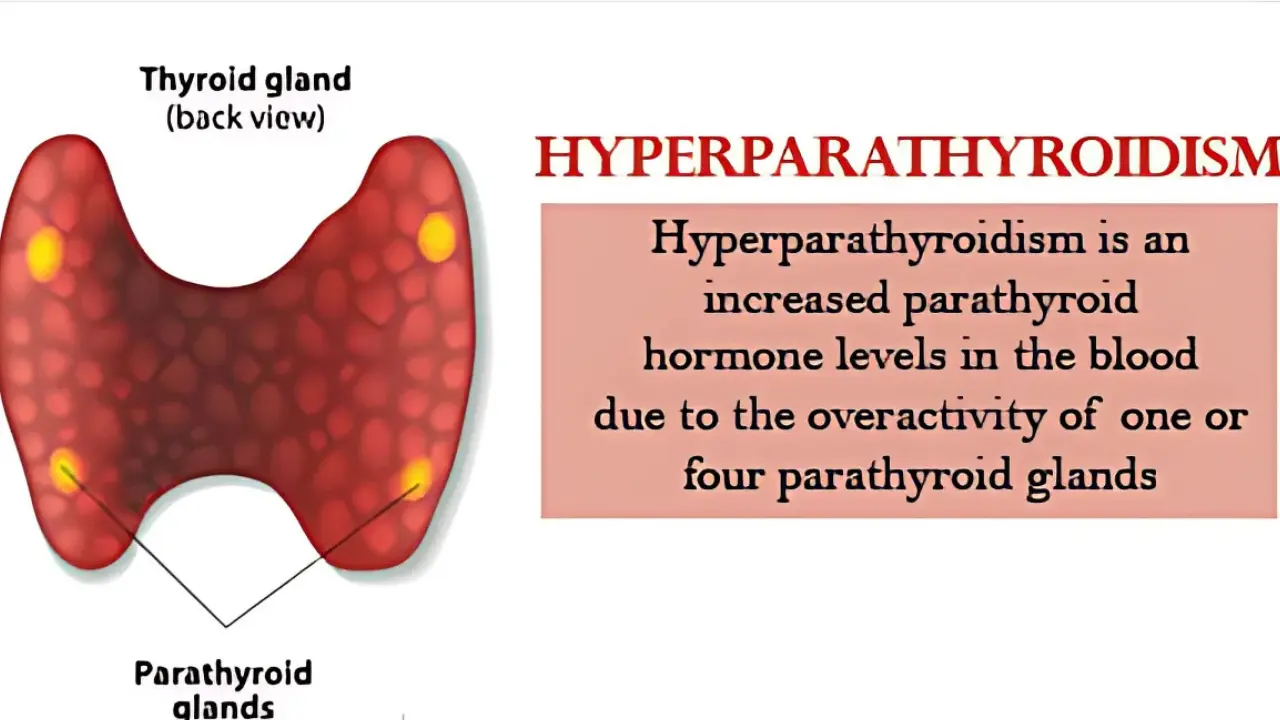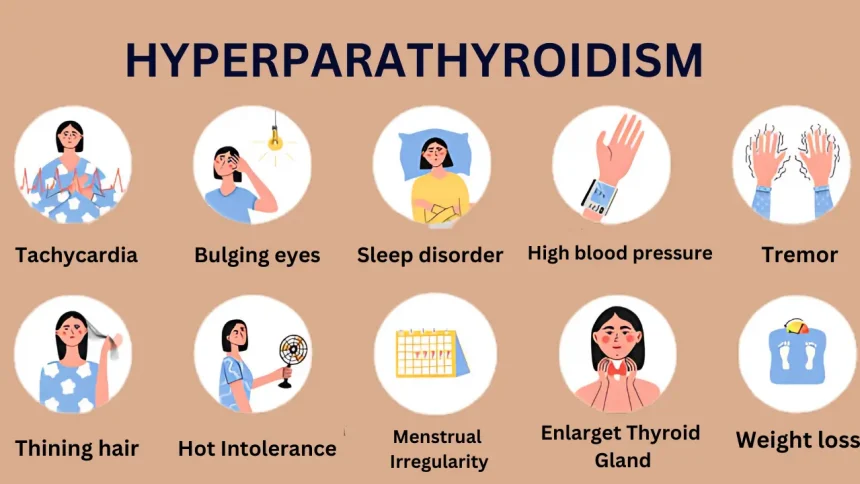Hyperparathyroidism
Hyperparathyroidism eye problems refer to complications in the eyes caused by the overactivity of the parathyroid glands, which results in elevated calcium levels in the blood. This condition can lead to issues such as calcification in the cornea or conjunctiva, blurred vision, or sensitivity to light, as excess calcium may deposit in eye tissues, affecting their normal function. Regular monitoring and management of calcium levels are essential to prevent these ocular complications. There are two main types:
Primary Hyperparathyroidism:
This is usually caused by a benign tumor (adenoma) on one of the parathyroid glands or hyperplasia of the glands. It can result in high calcium levels in the blood (hypercalcemia), leading to symptoms like fatigue, kidney stones, bone pain, and digestive issues.
Secondary Hyperparathyroidism:
This occurs as a response to low calcium levels, often due to chronic kidney disease or vitamin D deficiency. The parathyroid glands produce more PTH to compensate, which can also lead to bone problems over time.
Symptoms Of Hyperparathyroidism

Primary hyperparathyroidism is often diagnosed before signs or symptoms of the disorder occur. This is usually because an elevated level of calcium is found on routine blood tests. When symptoms do occur, they’re the result of damage or dysfunction in other organs or tissues. This damage or dysfunction is due to high calcium levels in the blood and urine or too little calcium in bones.
Symptoms may be so mild and nonspecific that they don’t seem related to parathyroid function, or they may be severe. The range of signs and symptoms include:
- Weak bones that break easily (osteoporosis)
- Kidney stones
- Excessive urination
- Stomach (abdominal) pain
- Tiring easily or weakness
- Depression or forgetfulness
- Bone and joint pain
- Frequent complaints of illness with no clear cause
- Nausea, vomiting or loss of appetite
Causes Of Hyperparathyroidism
Hyperparathyroidism is caused by factors that increase the production of parathyroid hormone.
The parathyroid glands keep proper levels of both calcium and phosphorus in your body by turning the release of parathyroid hormone off or on. This is similar to how a thermostat controls a heating system to maintain a constant air temperature. Vitamin D also is involved in controlling the amount of calcium in your blood.
When calcium levels in your blood fall too low:
your parathyroid glands release enough parathyroid hormone to restore the balance. This hormone raises calcium levels by releasing calcium from your bones, increasing the amount of calcium absorbed from your small intestine and decreasing the amount of calcium lost in urine.
When blood-calcium levels are too high:
the parathyroid glands produce less parathyroid hormone.
Calcium is best known for its role in keeping your teeth and bones healthy. But calcium also aids in the transmission of signals in nerve cells. And it’s involved in muscle contraction. Phosphorus, another mineral, works along with calcium in these areas.
Sometimes one or more of the parathyroid glands produce high amounts of parathyroid hormone. These high hormone levels can be the body responding appropriately to keep the calcium in the standard range, or they may be inappropriately elevating the calcium in the blood. Which one depends on the underlying problem.
Primary Hyperparathyroidism
Your parathyroid glands make parathyroid hormone (PTH). Primary hyperparathyroidism is when one or more of the parathyroid glands makes too much PTH. This can lead to bone tissue loss, high blood levels of calcium, and kidney stones. This condition is more common in women than in men. Sometimes primary hyperparathyroidism is part of a hereditary condition that involves tumors in many parts of the body.
PTH keeps blood calcium levels from going too low. It does this by releasing calcium from bones and reabsorbing calcium from the kidney. The hormone also conserves calcium that would be given off by the kidneys. And it increases how much calcium is absorbed from food. Too much PTH causes too much calcium to be released from bone. And the level of calcium in your blood rises.
Causes Of Primary Hyperparathyroidism
In some cases, no cause can be found. Some known causes include non-cancer (benign) tumors on the parathyroid glands, or enlargement of the glands. When there is a benign tumor in a parathyroid gland, it is called a parathyroid adenoma. When more than one gland becomes enlarged, it is called parathyroid hyperplasia. Both of these conditions are noncancer. In rare cases, it can be caused by a tumor that is cancer or a cyst that is noncancer.
Symptoms Of Primary Hyperparathyroidism
- Constipation
- Frequent urination
- Increased thirst
- Joint pain
- Kidney pain (due to the presence of kidney stones)
- Lack of energy and extreme tiredness (fatigue)
- Loss of appetite
- Muscle weakness
Other serious symptoms may include:
- Belly pain
- Depression
- Memory loss
- Nausea
- Vomiting
Secondary Hyperparathyroidism
Secondary hyperparathyroidism (SHPT) is a type of hyperparathyroidism. SHPT happens when a disease you have causes low blood calcium, which makes your parathyroid glands grow larger and make too much parathyroid hormone (PTH).
Causes Of Secondary Hyperparathyroidism
SHPT happens when another disease you have causes low levels of calcium in your blood. The most common cause of SHPT is end-stage renal disease (ESRD), also known as kidney failure.
Symptoms Of Secondary Hyperparathyroidism
- Weak or broken bones (osteoporosis)
- Bone and joint pain
- Kidney stones
- Urinating (peeing) more often than normal
- Belly pain
- Feeling weak or tired easily
- Feeling sick to your stomach or throwing up
- Feeling less hungry than usual (loss of appetite)
Treatment Of Hyperparathyroidism

Hyperparathyroidism is a disease where one or more of the small glands behind the thyroid (a gland in the neck) are working too hard. These four glands are called parathyroid glands, and they produce parathyroid (PTH) hormone. PTH regulates the amount of calcium in the blood. Calcium is important for strong bones and teeth, but it also helps muscles, nerves and other parts of the body function as they should.
When calcium levels in the blood are too low, the parathyroid glands make and release more PTH into the blood. PTH works like a chemical message telling the body it needs more calcium.
Hyperparathyroidism happens when one or more of the parathyroid glands is enlarged or has a tumor (growth). This causes the glands to work too hard and make more PTH than the body needs. As a result, the amount of calcium in the blood rises higher than it should. There are three types of hyperparathyroidism.


